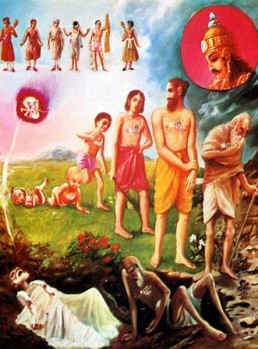Swami Chinmayananda
Swami Chinmayananda Commentary
Since the sense-organs are thus the saboteurs in the Kingdom of the Spirit that bring the disastrous downfall of the Empire of the Soul, Arjuna is warned here that, as a seeker of Self-perfection, he should constantly struggle to control his sense-organs and their mad lustful wanderings in their respective fields. Modern psychology would certainly look down with a squint-eye upon this Geeta theory, because, according to Freud and others, sensuousness is instinctive in man, and to curb it would lead to an unnatural suppression.
According to the West, TO CONTROL is TO SUPPRESS, and no science of mental life can accept that suppression is psychologically healthy. But the Vedic theory is not pointing to any mental suppression at all. It is only advising an inward blossoming, an inner growth and development, by which one’s earlier fields of enjoyments through the senses, drop out to make room for the perception of a newer field of ampler joys and more satisfying Bliss.
This idea is very well brought out here, when Lord Krishna, as though in the very same breath, repeats both the negative and the positive aspects of the technique of Self-development. He advises not only a withdrawal from the unhealthy gutters of sensuousness, but he also gives the healthy method of doing so by explaining the positive technique of Self-perfection. Through a constant attempt at focussing our attention “ON ME, THE SUPREME,” he advises the disciples to be steady.
In this simple-looking statement of half-a-verse, the Geeta explains the entire technique of Self-development. Immoral impulses and unethical instincts, that bring a man down to the level of a mere brute, are the result of endless lives spent among sensuous objects, during the infinite number of different manifestations, through which the embodied soul, the ego in each one of us, had previously passed. It is humanly impossible for an individual to erase and transcend in his life-time, the thick coating of mental impressions gathered along his journey from life to life, from embodiment to embodiment. Naturally, this is the despair of all the promoters of ethics, the teachers of morality and the masters of spirituality.
The Rishis of old, in their lived experience, discovered for themselves a technique, by which, all these mental tendencies could be eradicated. To expose the mind to the quiet atmosphere of meditation upon the All-perfect Being, is to heal its ulcers. By this process, one who has come to gain a complete mastery over his sense-organs, is considered as one who is ‘steadfast-in-Wisdom.’
The concealed suggestion in the stanza now becomes quite obvious; no one, who, with excessive force controls his Indriyas, by sheer strength of will and sense of abstinence, has any chance of flowering into a full-blown spiritual beauty. He who has all his sense-organs, of their own accord, lying tamely surrendered at his feet, who has come to re-discover the Infinite Perfection in himself, is called a man-of-Perfection. Neither has he ruined his instruments-of-cognition, nor has he closed down the arches-of-knowledge in him. A Perfect One is he whose sway over the animal in him is so complete that the inner Satan has become, for the Sage in him, a tame Caliban to run errands and serve faithfully.
NOW THE LORD PROCEEDS TO POINT OUT THE SOURCE OF ALL EVIL IN THE CASE OF THE UNSUCCESSFUL:
Adi Sankara Commentary
Samyamya, controlling, having subdued; sarvani, all; tani, of them; asita, one should remain; yuktah, concentrated; mat-parah, on Me as the supreme — he to whom I, Vasudeva, the inmost Self of all, am the supreme (parah) is mat-parah. The idea is, he should remain (concentrated) thinking, ‘I am not different from Him.’ Hi, for; the prajna, wisdom; tasya, of one, of the sannyasin remaining thus concentrated; yasya, whose; indriyani, organs; are vase, under control, by dint of practice; [The organs come under control either by constantly thinking of oneself as non-different from the Self, or by constantly being mindful of the evils that result from objects.] pratisthita, becomes steadfast. Now, then, is being stated this [This:what is described in the following two verses, and is also a matter of common experience.] root, cause of all the evils that beset one who is the verge of being overwhelmed:
The Bhagavad Gita with the commentary of Sri Sankaracharya – Translated by Alladi Mahadeva Sastry
Holy Geeta – Commentary by Swami Chinmayananda
The Bhagavad Gita by Eknath Easwaran – Best selling translation of the Bhagavad Gita
The Bhagavad Gita – Translation and Commentary by Swami Sivananda
Bhagavad Gita – Translation and Commentary by Bhaktivedanta Swami Prabupadha
Srimad Bhagavad Gita Chapter 2 – Verse 61 – 2.61 tani sarvani – All Bhagavad Gita (Geeta) Verses in Sanskrit, English, Transliteration, Word Meaning, Translation, Audio, Shankara Bhashya, Adi Sankaracharya Commentary and Links to Videos by Swami Chinmayananda and others – 2-61

